|
|
|
Sort Order |
|
|
|
Items / Page
|
|
|
|
|
|
|
| Srl | Item |
| 1 |
ID:
190101
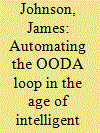

|
|
|
|
|
| Summary/Abstract |
This article argues that artificial intelligence (AI) enabled capabilities cannot effectively or reliably compliment (let alone replace) the role of humans in understanding and apprehending the strategic environment to make predictions and judgments that inform strategic decisions. Furthermore, the rapid diffusion of and growing dependency on AI technology at all levels of warfare will have strategic consequences that counterintuitively increase the importance of human involvement in these tasks. Therefore, restricting the use of AI technology to automate decision-making tasks at a tactical level will do little to contain or control the effects of this synthesis at a strategic level of warfare. The article re-visits John Boyd’s observation-orientation-decision-action metaphorical decision-making cycle (or “OODA loop”) to advance an epistemological critique of AI-enabled capabilities (especially machine learning approaches) to augment command-and-control decision-making processes. In particular, the article draws insights from Boyd’s emphasis on “orientation” as a schema to elucidate the role of human cognition (perception, emotion, and heuristics) in defense planning in a non-linear world characterized by complexity, novelty, and uncertainty. It also engages with the Clausewitzian notion of “military genius” – and its role in “mission command” – human cognition, systems, and evolution theory to consider the strategic implications of automating the OODA loop.
|
|
|
|
|
|
|
|
|
|
|
|
|
|
|
|
| 2 |
ID:
190100
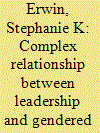

|
|
|
|
|
| Summary/Abstract |
Leadership, whether through response, composition, representation, or direction, reflects a complex relationship with gender in the military. The findings of this qualitative study highlighted the profound and complex relationship between leadership and gendered experiences within the military in a variety of facets including within various ranks, from superiors, subordinates, and peers, as well as both as and with leaders. This includes considerations, or lack thereof, for issues pertaining to representation, voice, gender bias, stereotyping, and intersectionality in addition to the significant and prominent issues of sexual misconduct. Military leadership development efforts, both at large and for women in particular, must reflect the pivotal role which leadership plays while simultaneously acknowledging the unique cultural and contextual environment of the military. In addition to continued efforts to encourage and enable women’s military service and leadership, military and civilian leadership, regardless of gender, should be cognizant of the magnitude of leader roles and responsibilities pertaining to gender.
|
|
|
|
|
|
|
|
|
|
|
|
|
|
|
|
| 3 |
ID:
190104


|
|
|
|
|
| Summary/Abstract |
The United Kingdom’s homeland resilience capacity is poor. The COVID-19 pandemic proved this. Back in 2019, the UK had been labeled as the best prepared country in the world for a pandemic. And yet, by 2020, and once COVID-19 had struck, the UK became “unequivocally” the hardest hit country in Europe – particularly in terms of excess mortality. In this article it is argued that the UK’s continental neighbors coped better than the UK because they had better homeland resilience capacity. This was provided by their having civil defense organizations, paramilitary forces and militaries which are specifically designed to contribute to homeland emergencies. The UK, in contrast and almost uniquely in the world, lacks both civil defense and paramilitary bodies and, moreover, it has armed forces that are not actually structured to provide help in domestic emergencies. Given the problems highlighted during COVID-19, is it now time for the UK to set up its own bodies specifically tasked with alleviating domestic emergencies? This article explores this question by comparing the UK’s pandemic response with that of Spain – a country which, according to all available data, should have performed worse than the UK. But it did not. Why?
|
|
|
|
|
|
|
|
|
|
|
|
|
|
|
|
| 4 |
ID:
190105
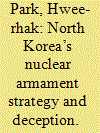

|
|
|
|
|
| Summary/Abstract |
This article analyzes North Korea’s nuclear armament strategy. For this purpose, it applies Vipin Narang’s theory to North Korea and analyzes North Korea’s efforts to develop and strengthen its nuclear weapons on a strategic level. This study argues that North Korea’s deception operations were crucial to the ultimate success of its “strategic” nuclear buildup. This article found that North Korea initially employed a “hiding strategy,” but after its nuclear program was exposed, it managed to continue its nuclear program through deceptive agreements with the United States and eventually succeeded in developing nuclear weapons in 2013. Then, North Korea adopted a “sprinting strategy” and initiated deceptive denuclearization negotiations with the United States to prevent a military strike by the United States and gain the time necessary for its continuous nuclear buildup. China also allowed a “sheltered pursuit” through tolerance of North Korea’s nuclear armament and diplomatic assistance as well as various clandestine assistances.
|
|
|
|
|
|
|
|
|
|
|
|
|
|
|
|
| 5 |
ID:
190103
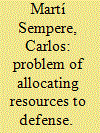

|
|
|
|
|
| Summary/Abstract |
This article addresses the problem that societies face for properly allocating resources to grant security to their members. It examines the methods and ways for setting and distributing these resources to obtain enough military capabilities to face threats. The problem: the choice of an allocation that optimizes social welfare is an old and constant concern for public policies. The main novelty of this article is to explore this problem from the bounded rationality of human beings, i.e. choices made under imperfect information, preferences unsupported by economic rationality or the constrained effectiveness of non-market arrangements for deciding adequately. These issues may drive to allocations that do not obtain the largest welfare.
|
|
|
|
|
|
|
|
|
|
|
|
|
|
|
|
| 6 |
ID:
190102


|
|
|
|
|
| Summary/Abstract |
This article examines how specific characteristics of defense intelligence affect the relationship between intelligence producers and their clients in a manner that is different from prevailing conceptualizations commonly found in civilian intelligence organizations. To do so, the paper first addresses some important distinguishing characteristics of defense intelligence. These include the embedded character of defense intelligence agencies in military organizations, specific military cultural traits and the mixture of military and civilian personnel. Based on literature study and desk research, the paper then identifies three producer-client paradigms: I) distance versus closeness, II) the ideal of analytic objectivity, and III) intelligence lays the foundation for decision-making. Confronting these paradigms with the characteristics of defense intelligence, we find that defense intelligence producer-client relations are more multifaceted, layered and networked than commonly explained.
|
|
|
|
|
|
|
|
|
|
|
|
|
|
|
|
| 7 |
ID:
190099
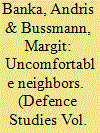

|
|
|
|
|
| Summary/Abstract |
To what ends do allies employ military exercises? In order to further our understanding regarding the logic and utility of military drills, this paper focuses on NATO’s eastern flank. Specifically, with the help of newly compiled data, we tracked two decades of exercises in the Baltic states. Our analysis speaks to the fact that the size, tempo, and character of military training events in this region have manifestly changed. In the early 2000s, military drills were primarily conceived as a mechanism to modernize Baltic armed forces and ensure their adequacy to NATO membership standards. The 2014 Crimea crises, however, dealt a serious blow to the regional order. This event was the primary driver behind a considerable spike in the overall exercise numbers. At the same time, we observe that it was not only a mere quantitative shift that transpired. From parachute drops into remote areas, rehearsals of river crossings to moving of combat power via narrow land corridors, the staging of military exercises after 2014 were overhauled into events that accentuated NATO’s reinforcement capabilities. In this context, military exercises can be seen as a crucial element to credibly signal capacity and resolve within the concept of deterrence by reinforcement.
|
|
|
|
|
|
|
|
|
|
|
|
|
|
|
|
|
|
|
|
|